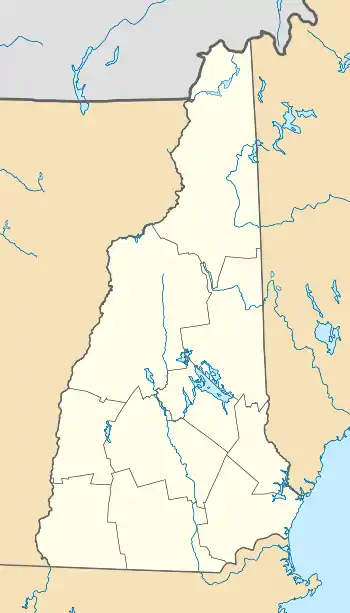Wilder-Holton House
The Wilder-Holton House is a historic house museum at 226 Main Street in Lancaster, New Hampshire. Built in 1780, this two-story timber-frame house is believed to be the first two-story house built in the area, and to be the oldest surviving house in Coos County. It was listed on the National Register of Historic Places in 1975.[1] The house is now owned by the Lancaster Historical Society, which operates it as a museum.
Wilder-Holton House | |
 | |
  | |
| Location | 226 Main St., Lancaster, New Hampshire |
|---|---|
| Coordinates | 44°30′11″N 71°34′41″W |
| Area | less than one acre |
| Built | 1780 |
| Architectural style | Federal |
| NRHP reference No. | 75000231[1] |
| Added to NRHP | June 11, 1975 |
Description and history
The Wilder-Holton House is prominently located at the northern end of Lancaster's Main Street, on the north side of the triangular junction of United States Routes 2 and 3. It is a two-story wood-frame structure, covered by a hip roof and finished in wooden clapboards. It is roughly square in shape, presenting five-bay facades in two directions. The main entrance faces east, sheltered by a single-story porch extending across three bays. There are presently three chimneys, although the remains of a large central chimney are found in the basement. The interior is presently arranged as a center-hall plan, and includes a large ballroom space on the second floor.[2]

The house was built in 1780 by Jonas Wilder, and is believed to be the first two-story building to be erected in what is now Coos County. It is also the oldest known surviving house in the county, earlier single-story buildings having succumbed. The house was a prominent local meeting point, serving in the 1790s for religious services before a church was built, and as the site of town meetings. In the early 19th century it probably also served as a boarding house, primarily serving visitors to the nearby county courthouse. It was originally associated with a much larger agricultural land-holding, and was associated with farming until the early 20th century. It has been owned by the Lancaster Historical Society since at least the 1960s.[2]
See also
References
- "National Register Information System". National Register of Historic Places. National Park Service. March 13, 2009.
- "NRHP nomination for Wilder-Holton House". National Park Service. Retrieved 2014-04-23.
